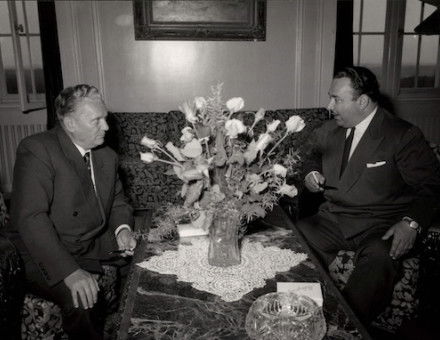Nicephorus II Phocas crowned Emperor of Byzantium
The Byzantine ruler claimed his throne on August 16th, 963.
 Born in what is now Turkey in about 912, the new emperor came from an aristocratic military family. His father and grandfather were both generals and Nicephorus and his younger brother Leo followed in their footsteps. Nicephorus was far the most outstanding of them and when his father was wounded in battle in 953 Nicephorus was appointed to succeed him. His first great achievement came when, in command of more than 50,000 men and a fleet of hundreds of ships, he led an invasion of Crete, which in 961 drove out the Arabs who had held it for well over 100 years and restored the island to the Byzantine Empire. The victory made Nicephorus a popular hero in Constantinople.
Born in what is now Turkey in about 912, the new emperor came from an aristocratic military family. His father and grandfather were both generals and Nicephorus and his younger brother Leo followed in their footsteps. Nicephorus was far the most outstanding of them and when his father was wounded in battle in 953 Nicephorus was appointed to succeed him. His first great achievement came when, in command of more than 50,000 men and a fleet of hundreds of ships, he led an invasion of Crete, which in 961 drove out the Arabs who had held it for well over 100 years and restored the island to the Byzantine Empire. The victory made Nicephorus a popular hero in Constantinople.
The Emperor Romanus II next sent him to drive the Arabs out of Cilicia (the south-eastern area of modern Turkey) and to press on into Syria, where he took Aleppo, temporarily at least, aided by his right-hand man, his nephew John Tzimisces. Nicephorus was killing Arabs in such numbers that he was admiringly called ‘the White Death of the Saracens’. He was a complicated character. A brave leader and a brilliant tactician, he had a deeply pious and austere side to him. He spent hours every day in prayer, wore a monk’s hair shirt, slept on the floor instead of a bed and apparently cared nothing for women.
Events took an unexpected turn when Emperor Romanus died young in March 963, leaving his widow, the Empress Theophano, as regent for their sons, Basil and Constantine, five and three years old respectively, who had already been crowned as co-emperors. The regime’s chief eunuch, Joseph Bringas, continued in charge of the administration and Theophano knew that he was intriguing against her.
Now in her early twenties, Theophano came from a humble Greek background. She was by all accounts a Byzantine Delilah. Winningly attractive and profoundly unscrupulous, she was determined that her sons should rule the empire when their time came. She felt that both she and they needed a powerful protector and the obvious candidate was Nicephorus. She sent word to him, urging him to come to Constantinople at once. This he did, bringing with him a famous relic he had seized in Aleppo, the tunic of John the Baptist. In secret talks he and Theophano quickly agreed that she would support him as the new emperor to replace Romanus and he would protect her two young sons, who would be his co-emperors. He was more than twice her age and had no children of his own. It seems that she seduced him and he fell in love with her.
Nicephorus went back to rejoin his army. In July, spurred on by John Tzimisces, his soldiers acclaimed him as emperor and he marched on Constantinople, where Bringas was overthrown. In August Nicephorus was crowned by the Patriarch Polyeuctus in the great church of Hagia Sophia. In September he and Theophano were married.
According to Bishop Liudprand of Cremona, who was Otto the Great of Germany’s emissary to Constantinople, Nicephorus for all his successes in war was an ugly little pygmy of a man with tiny eyes like a mole and a squat neck, swarthy skin and a bulging belly. John Julius Norwich in Byzantium: The Apogee describes him as ‘saintly and hideous, magnificent and insufferable’ and ‘clearly a cold fish’.
As emperor, Nicephorus made himself thoroughly unpopular by rigorously reducing the regime’s spending on the court, the clergy and the monasteries, by increasing taxation to unprecedented levels and by refusing to help the poor during a series of famines. He became increasingly solitary, driven in on himself and suspicious of his advisers, and he made a fatal mistake in dismissing John Tzimisces from his military command.
Theophano grew convinced that the emperor’s brother Leo and the Phocas family meant to oust her children from the succession. She and John Tzimisces became lovers and organised a conspiracy to kill Nicephorus. On a December night in 969 a group of plotters dressed as women, their swords concealed in their gowns, went to the palace and hid in Theophano’s quarters. Later, when all was quiet, they made their way to the emperor’s bedroom, which Theophano had carefully left unbolted. John Tzimisces reproached him bitterly for his ungratefulness and Nicephorus was beaten up and finally stabbed to death, after which his head was cut off. Tzimisces was accepted almost immediately as emperor. He and Theophano had planned to marry, but instead he sent her into exile at the insistence of the scandalised ecclesiastical authorities. Both her sons succeeded to the imperial throne in due time as Basil II and Constantine VIII. Basil was reported, not surprisingly perhaps, to have a permanent distrust of women.




